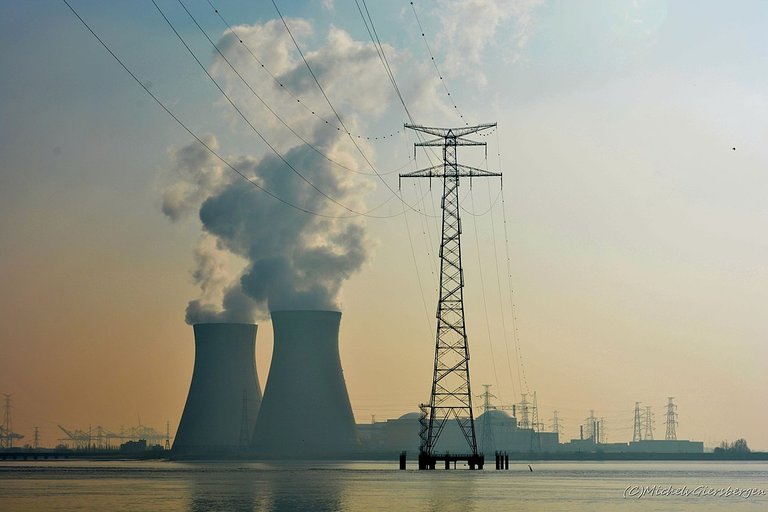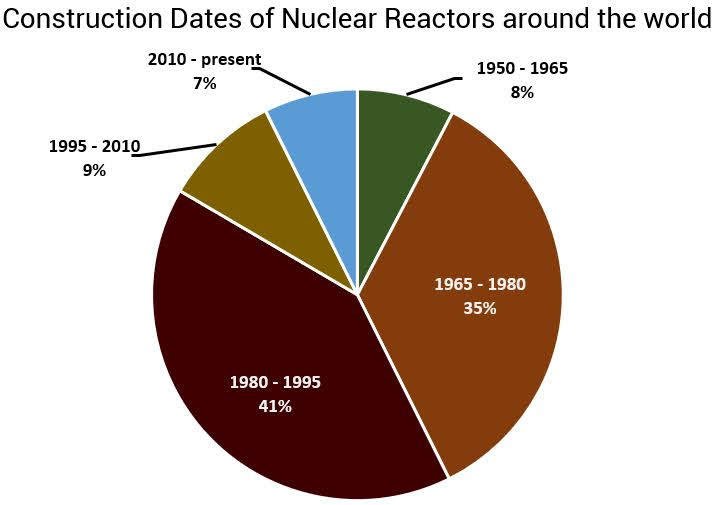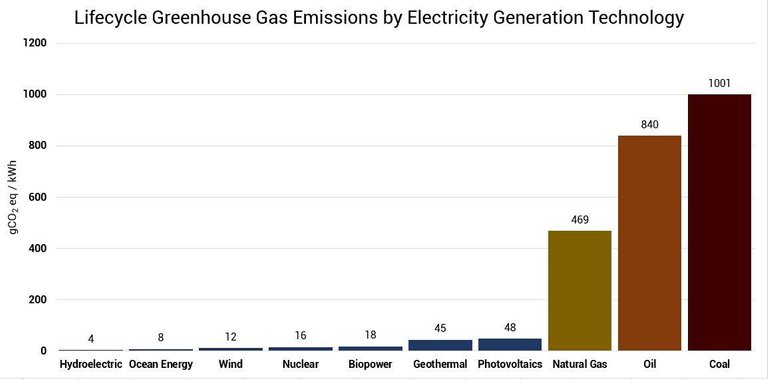Amongst politics, sports or whether to use windows or apple, I believe it is safe to put nuclear energy into the list of most debated topics. Already since the discovery of practical uses for nuclear fission, the energy source has been related to the destructive forces of atomic weapons or nuclear meltdowns resulting in entire regions made inaccessible and radioactive materials possibly leaking into nature such as happened in Chernobyl or Fukushima. But why on earth does it still makes up 10% of our global energy production? If you give me a moment of your time I will try to explain to you why nuclear energy is not that bad and why it might be better if it made up even more of the global energy production.

Nuclear power plant located in Antwerp, one of the biggest Belgian cities. Shared under CC BY-SA 4.0 by Michel van Giersbergen. fyi: The towers are not the nuclear power plant. These only serve to cool the plant via condensation of water. Similar towers can also be seen on plants that burn fossil fuels for example. The actual reactor is more often a dome on the site, or even under ground.
Common misconceptions
Nuclear technology is dangerous
To put it shortly, almost all nuclear power plants use outdated technology. The weighted average age of all operating reactors was 29 in 2015 and still increasing. Meaning more and more are becoming out dated than new reactors are being built. over half of all plants have worked for more than 30 years and 54 have run over 40 years. To put that into perspective, more than 50% were already active when the internet was developed and portable CD players became a thing.
Of course plants can be renovated and they are eventually designed to last that long (common lifetime prediction of 40 years with possible extensions), but this does not take away the fact that in the meantime new core technologies have been developed. And if all plants would actually close after the proposed lifetime of 40 years, 188 new units would have to be replaced by 2030. Currently 60 new reactors are in the process of being built of which 75% are delayed. Furthermore almost half of these are built in China. If we even want to sustain the same power production we have to achieve five times the number of new startups achieved in last decade, or used dated technology.
Graph illustrating construction time of reactors in the world. Almost all reactors are constructed between 1965 and 1995. In the last 10 years almost no new reactors have been finished and there are almost more plants being decommissioned than that are being built. Data from Schneider, Frogatt, Hazemann, Tadahiro, &; Thomas (2015).
So the perception that people have about nuclear power plants is actually a perception of how they were 30 years ago. If you want see what new technology looks like, I can direct you to this page by "world-nuclear.org/..." with a lot of text and facts, or this wikipedia page. These are not only more efficient and have a longer lifetime, but also a lot safer.
Nuclear waste is a hazard to the environment
Most of the waste is easily disposable and recyclable. Even the high radioactive waste can be reduced by about 85% when it is recycled into fresh fuel. If you would combine all leftover high level radioactive waste ever produced you would fill a soccer field up to about 3 meters (IAEA estimates, 2018).
And to put nuclear waste into a context, you have to consider the byproducts of other large-scale commercial electricity producing technologies. Fossil fuels supplied in 2016 67% of our energy demand, releasing approximately 15 Gigatonnes (Gt) of CO2 into the atmosphere. Nuclear power on the other hand would only produce 2% of that, cutting global CO2 emissions almost in half (in 2017 32.5 Gt were emitted according to OECD/IEA, 2018).
Mean equivalent of CO2 emission per kWh for different energy sources. Note that nuclear energy by mean ranks even better than Photovoltaics, biopower and geothermal energy. Data from the IPCC's special report on renewable energy sources and climate change mitigation (SRREN). If you want more information about this data I suggest you visit the report.
In over 50 years of nuclear power generation and waste management not a single case is recorded of any serious health or environmental problems or risks. Working at nuclear plants is also considered as one of the safest industrial working environments in the US according to the Nuclear Energy Institute (NEI).
And as a last addition I want to add that nuclear reactors are not the only industry creating radioactive waste. Radioactive material produced in the oil and gas industry might be called 'Technologically Enhanced Naturally Ocurring Radiactive Materials' (TENORM), but it still has almost 1000 times more radiation than allowed for recycling.
Failure of nuclear power plants can cause explosion or natural disaster
First of all, nuclear reactors cannot explode like an atomic bomb. Natural uranium contains about 0.7% of the usable U-235 isotope, the remaining 99.3% is U-238. Nuclear reactors commonly require enrichment up to 3-5% of U-235 while an atomic bomb requires an enrichment to about 85%. (although 20% enriched uranium could be weaponized, it would require a critical mass of hundreds of kilograms of the material which is impractical and rarely achieved in nuclear reactors. Therefor it is impossible for a nuclear reactor to explode as an atomic bomb.
Three Mile Island, Chernobyl and Fukushima
 Three Mile Island nuclear power plant. Image in public domain.
Three Mile Island nuclear power plant. Image in public domain.There have been three major reactor accidents in the history of civil nuclear energy. First there was Three Mile Island in 1979. The cooling system malfunctioned and caused a part of the core to melt. during shutdown a valve that should have been closed stayed open. There was no sensor to directly detect the valves position so this was only restored later while some radioactive gas was already released in the atmosphere. But the dose was not enough to cause significant danger to the surrounding.
Secondly we have the Chernobyl accident in Ukraine, 1986. A flawed reactor design was operated by inadequately trained personnel and caused a steam explosion. 5% of the radioactive core was released into the atmosphere during the fire. The rest of the story is probably familiar to most readers, 30 operators and fireman died within the following months due to radiation poisoning of the first day, and many rescue workers were exposed to high doses of radiation. Now there seems to be no major public health impact after 14 years of radiation exposure and it is officially a tourist attraction. This type of reactor has never been built outside of the former Soviet Union.
And lastly the Fukushima incident. A tsunami in 2011 hit the cooling systems of three Japanese reactors. radioactive cooling liquids were not contained enough and leaked. No deaths or serious injuries were reported although 19.000 people were killed by the tsunami.
Rest assured
These were the only major accidents during the more than 17.000 cumulative reactor-years of commercial plants. No industry is secure for all accidents, but every industry learns from past failures. Nuclear energy should be considered extremely safe since each year, thousands of people die in coal mines and indirect health hazards of fossil fuels such as pollution and climate change should be taken into account as well.
table showing the number of total fatalities, and the fatalities per TWy (TeraWatt year) within different industries. Data from The World Nuclear Associeation.
Conclusion
Nuclear energy can be seen as the 'aerospace industry' of the energy sector. Terrible accidents have made headlines in the last decades, but exactly because of that, the industry is one of the most secure and safest around.
Plants are also continuously inspected and redesigned to withstand current threads. Taking all of this into account I really don't understand why there are so many movements against nuclear energy. Is it the lack of a bigger picture? Bad image constructed over the years? When I see promising countries like Germany announcing a Nuclear power Phase-out I can only hope it gets replaced by better alternatives than their immense brown coal industry...
What is your opinion on this? Did I miss a certain point of view? let me know!

Sources
Schneider, M., Frogatt, A., Hazemann, J., Tadahiro, K., & Thomas, S. (2015). STATUS REPORT 2015 Mycle Schneider Antony Froggatt Julie Hazemann Tadahiro Katsuta Steve Thomas.
IAEA. (2018). Nuclear Energy Series Status and Trends in Spent Fuel and Radioactive Waste Management.
OECD/IEA. (2018). Global Energy & CO 2 Status Report, (March). Retrieved from http://www.iea.org/publications/freepublications/publication/GECO2017.pdf
Bou-Rabee, Firyal & Al-Zamel, Abdallah & Al-Fares, Rana & Bem, Henryk. (2009). Technologically enhanced naturally occurring radioactive materials in the oil industry (TENORM). A review. Nukleonika. 54. 3-9.
https://kleinmanenergy.upenn.edu/policy-digests/why-some-nations-choose-nuclear-power
https://www.worldnuclearreport.org/The-World-Nuclear-Industry-Status-Report-2015-HTML.html
http://www.world-nuclear.org/information-library.aspx
https://en.wikipedia.org/wiki/Generation_III_reactor
https://www.eia.gov/energyexplained/index.php?page=nuclear_environment
http://nuclearconnect.org/know-nuclear/talking-nuclear/top-10-myths-about-nuclear-energy
https://en.wikipedia.org/wiki/Enriched_uranium



This is a good way to think about it. Nuclear accidents are feared way out of proportion to the actual danger.
Posted using Partiko Android
It would of course be reductive to say nuclear energy does not have any dangers, but it would be just as simplistic to say we should stop using it all together.
better left for the past.
We have no place to store it. Well unless you plan on being around for the half-life of some of the nice things that have a half-life longer than the Holocene.
Great post though!
Thanks for stopping by!
That is part of the point I try to make. Why do we assume we do have place to store the 9 Gigatons of carbon we produce each year. There are possible ways to store material for such a long period deep under ground (I must admit that this has not been undertaken yet) where it should stay stable. I mentioned it in a previous comment as well:
I think it all boils down to the question: Do we want a lot of slightly bad carbon waste that we cannot contain, or do we want a fraction of that waste (less then one millionth to be precise) but which is highly dangerous and lasts 100 times longer. And perhaps this will always be a personal choice.
Really good points!
In response to your follow up of:
"Do we want a lot of slightly bad carbon waste that we cannot contain, or do we want a fraction of that waste (less then one millionth to be precise) but which is highly dangerous and lasts 100 times longer. And perhaps this will always be a personal choice."
I vote lots of slightly bad carbon waste we cannot *yet contain over smaller but super dangerous radioactive waste with no place to put it.
This is because the harsh radioactive waste effects all life that comes in contact with it. Reminds me of the book "the beach".
Thanks for the great post!
Hi @samve! I really liked this post and I feel like I'm being left behind the times.
I am a curator for the You Got Snekked curation project and this is just to let you know that...:
You got SNEKKED! ;)
Expect a certain Snek to come 'round and give you a bite soon ;)
You Got Snekked is a curation project!
We aim to find good content, share a happy moment, & some visibility. Your post got our upvote, and we will feature your post and possibly an image from it in our 39th curation compilation if you don't mind! If you don't want to be featured, please let us know!
Also, feel welcome to join our community on Discord! -:

https://discord.gg/VWJxTEz
Thanks! what an awesome project actually, I'll make sure to check it out!
I was not a big fan when germany closed their nuclear power plants. Stable piece of crust without eathquakes or tsunamis. Hard to cause a natural disaster that could harm a plant. And after shutdown, they started to discuss new coal plants... Seemed a little off to me.
I believe a few extreme events better catch the eye of the public than the consistent side effects associated with other industries. Even in regions where the risks are even smaller as you said. Maybe it is also a job-thing? Similar how they try to create jobs in the US, but more subtle. I can imagine how policy makers won't oppose a nuclear phase-out if it creates a lot of new jobs.
I assumed that a power plant and a coal plant require an equal amount of jobs. Required nuclear power less manpower per power produced?
I'm not an expert on Germany, but I don't think they have uranium deposits, so they would have to import their material. But they do have plenty of coal deposits. So even if nuclear energy would create more jobs ("IF"), switching to coal would create "German" Jobs.
Damn, that should have been obvious to me... Now things make a little more sense again. Thanks 😃
Please check the image copyrights so we could upvote you
I used those images because they represented exactly what I needed, but indeed it cannot be labeled as fair use. So I used the data to create my own figures that even better show the essence. I think now I'm copyright-proof? I'm really conscience about it when I write my articles but it isn't always easy ;)
It pains me to disagree with someone for whom I have such respect. And certainly you know a lot more about the technical side of this subject than I do. However, I am troubled by some aspects of your post and would like to call them to your attention:
Throughout you compare the dangers and environment impact of nuclear to fossil fuels. This is the wrong paradigm. We have to look to the future, not the past. We have to look to what we might be and not what we have been. If you think of all the resources, financial and intellectual, that have gone into the development of nuclear (and I mean, go back to pioneers in atomic science, to the Manhattan Project, etc.) we have done nothing, by comparison, for the development of renewables (truly green, not radioactive). Imagine if there was a Manhattan Project for the development of storage batteries? And not only for energy storage, but energy collection.
You minimize the risk of nuclear and attribute it to out-dated technology. But no matter how "safe" we make this technology, the fact remains there will always be some waste, some byproduct of this energy that must be stored (nobody wants it) and secured. It will always be a target for bad actors and accidents--no matter how far in the future. Wouldn't it be smart to dedicate ourselves to a form of energy that does not have this legacy cost?
There are environmental costs to the production of nuclear--impacts on aquatic life. Plants are located near bodies of water for cooling purposes--as outlined in the link, life associated with that water source is negatively, or can be negatively impacted.
The process of mining uranium has serious environmental consequences. These consequences on the front end of nuclear energy must be considered in its "cost" and danger.
This is not an exhaustive consideration of the downside of nuclear energy. Just a few points off the top of my head. There is much more to be said, but after all, this is a comment, not a blog :)
Hope you don't mind my contrary view. Offered always with respect.
No on the contrary! I like the fact that you critique my writing and start a discussion. And with all due respect, I can only share my point of view on your remarks 😉
Indeed Nuclear power is not a green energy source and it has its downsides, Al I want to do is get rid of it's bad image, just because it has consequences that are easy to visualize (the disasters so to speak) while other industries, such as fossil fuels easily have an even more dramatic impact and still get away with it.
Thanks for leaving your feedback! It's nice to hear from you.
Thank you for taking the time to reply and going through each of my points. The sad part is, so much of what you say is true. And we are in an immediate crisis--very little time left to address the effects of fossil fuels. But if we "dedicate" ourselves to uranium, if there's an easy out, where will the motive come from to invest in a better future?
Actually, meatless Mondays are becoming quite popular:)
I think the education you offer on the danger of fossil fuels is a service to the planet, but I can't endorse dedicating resources to a nuclear future. Just can't do it...
The motivation for green energy sources will always be there, because as you also mentioned, nuclear energy is not ideal. I am still a strong supporter of actual green energy sources and changes in habits to reduce energy demand. But if I had to choose between replacing fossil fuels with green energy over time, or changing nuclear energy with green energy over time, that's what I'll choose.
It feels indeed like choosing between pest and cholera. I think it all boils down to the question: Do we want a lot of slightly bad carbon waste that we cannot contain, or do we want a fraction of that waste (less then one millionth to be precise) but which is highly dangerous and lasts 100 times longer. And perhaps this will always be a personal choice.
You captured it...and you've made me think long and hard...
The reason there are so many movements against nuclear energy is that people do not take all of this into account!
Most people are misinformed, the media exaggerates the negatives and ignores the positives, and many are naive enough to not want to hear the truth about the positives. Most people also do not understand that renewables cannot entirely replace nuclear/coal since their energy production is not consistent enough and not of high enough volume.
The disasters correlated with nuclear power are also worth the headlines but the sad thing is that the consequences of other fuels don't create these extreme events. They rather kill us slowly which reduces the 'need for immediate action'. Of course there are also people strongly against fossil fuels, but they often offer no immediate alternative other than 'we should consume less and place more renewables'. And that is great! really! And will eventually be our best way out, but it is not realistic for the current problems and needs as you already mentioned.
Thanks for stopping by!
Hi @samve!
Your post was upvoted by @steem-ua, new Steem dApp, using UserAuthority for algorithmic post curation!
Your UA account score is currently 2.470 which ranks you at #16430 across all Steem accounts.
Your rank has dropped 57 places in the last three days (old rank 16373).
In our last Algorithmic Curation Round, consisting of 391 contributions, your post is ranked at #299.
Evaluation of your UA score:
Feel free to join our @steem-ua Discord server
Congratulations @samve! You have completed the following achievement on the Steem blockchain and have been rewarded with new badge(s) :
Click on the badge to view your Board of Honor.
If you no longer want to receive notifications, reply to this comment with the word
STOPDo not miss the last post from @steemitboard: